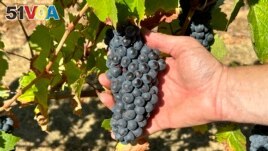07 October 2023
The West Coast of the United States produces over 90 percent of America's wine, an alcoholic drink. However, the area is also prone to wildfires.
Such fires cost the American wine industry billions of dollars in 2020. The smoke affects the flavor of the growing grapes that later become the wine. And, the flavor is undesirable, say some wine drinkers.
So, wine experts from state universities in the area are working together to protect wine grapes from wildfire smoke.

Oregon State University students show Pinot noir grapes at the university's vineyard near Alpine, Ore., on Friday, Sept. 8, 2023. (AP Photo/Andrew Selsky)
In 2020, economists say, wildfires caused billions of dollars of losses, which included the wine industry.
As a result, the U.S. Department of Agriculture is paying for grape research at some state schools. They include University of California, Davis (UC Davis), Oregon State University and Washington State University. The research investment is worthy, agriculture officials say, because wine grapes are America's highest-value crop.
Tom Collins is a wine scientist at Washington State. He said "the ability to continue to make wine" is at risk in areas where smoke might be more common.
Cole Cerrato is a researcher working on the problem in Oregon. He stood in Oregon State's vineyard, near the small town of Alpine. He lit a fire and blew the smoke through a hose and into a row of grapes covered in plastic.
Cerrato and other researchers have done this before. They turned the treated grapes into wine. The result was, the wine had an unpleasant flavor of smoke and ash.
The scientists are working to find a way to keep the smoke from getting through the grape skins and creating a bad taste in the wine.
Some are trying to create a process that will treat wine and remove the smokiness. But they are concerned such a process might remove some of the wine's good flavors, too.
Others think they can combine smoke-affected grapes with other grapes. The mix might lessen the smoky flavor.
And Collins is working on a spray made from water and a kind of clay that would protect the grapes from smoke. But all the grapes would need to be washed first before being turned into wine.
Oregon State is experimenting with a similar spray treatment for grapes.
In addition, the USDA has provided $7 million toward setting up smoke sensors in vineyards.
Anita Oberholster is leading the efforts to save the wine grapes at UC Davis. In an internet post by UC Davis, she said a network of sensors would help grape growers learn if their grapes are at risk. In addition, the readings from the sensors will permit the growers to prove their grapes are free from smoke damage.
Winemakers are glad that the universities are working to help the industry. Greg Jones runs the Abacela winery in southern Oregon and is the director of the state's winemaking trade group.
He said the research has "gone a long way." Now the grape-growers can quickly find out if the fruit has been hurt by the smoke. In the past, winemakers would not know about the wine until it was ready to drink.
"I think it's increasingly clear that we're not likely to find a magic bullet," Collins said. But, he said, the researchers will find ways to keep the wine business successful.
I'm Dan Friedell.
Dan Friedell adapted this story for Learning English based on a report by the Associated Press.
__________________________________________________
Words in This Story
prone–adj. likely to do or suffer from something
flavor –n. the taste of something
spray–n. liquid forced out of a container in very small drops
sensor –n. a device that detects something, such as the presence of smoke
bullet –n. a piece of metal shot out of a gun